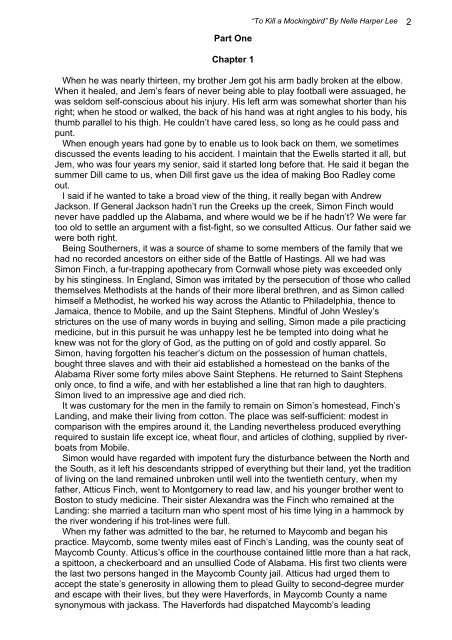Create successful ePaper yourself
Turn your PDF publications into a flip-book with our unique Google optimized e-Paper software.
Part One<br />
Chapter 1<br />
“To Kill a Mockingbird” By Nelle Harper Lee 2<br />
When he was nearly thirteen, my brother Jem got his arm badly broken at the elbow.<br />
When it healed, and Jem’s fears of never being able to play football were assuaged, he<br />
was seldom self-conscious about his injury. His left arm was somewhat shorter than his<br />
right; when he stood or walked, the back of his hand was at right angles to his body, his<br />
thumb parallel to his thigh. He couldn’t have cared less, so long as he could pass and<br />
punt.<br />
When enough years had gone by to enable us to look back on them, we sometimes<br />
discussed the events leading to his accident. I maintain that the Ewells started it all, but<br />
Jem, who was four years my senior, said it started long before that. He said it began the<br />
summer Dill came to us, when Dill first gave us the idea of making Boo Radley come<br />
out.<br />
I said if he wanted to take a broad view of the thing, it really began with Andrew<br />
Jackson. If General Jackson hadn’t run the Creeks up the creek, Simon Finch would<br />
never have paddled up the Alabama, and where would we be if he hadn’t? We were far<br />
too old to settle an argument with a fist-fight, so we consulted Atticus. Our father said we<br />
were both right.<br />
Being Southerners, it was a source of shame to some members of the family that we<br />
had no recorded ancestors on either side of the Battle of Hastings. All we had was<br />
Simon Finch, a fur-trapping apothecary from Cornwall whose piety was exceeded only<br />
by his stinginess. In England, Simon was irritated by the persecution of those who called<br />
themselves Methodists at the hands of their more liberal brethren, and as Simon called<br />
himself a Methodist, he worked his way across the Atlantic to Philadelphia, thence to<br />
Jamaica, thence to Mobile, and up the Saint Stephens. Mindful of John Wesley’s<br />
strictures on the use of many words in buying and selling, Simon made a pile practicing<br />
medicine, but in this pursuit he was unhappy lest he be tempted into doing what he<br />
knew was not for the glory of God, as the putting on of gold and costly apparel. So<br />
Simon, having forgotten his teacher’s dictum on the possession of human chattels,<br />
bought three slaves and with their aid established a homestead on the banks of the<br />
Alabama River some forty miles above Saint Stephens. He returned to Saint Stephens<br />
only once, to find a wife, and with her established a line that ran high to daughters.<br />
Simon lived to an impressive age and died rich.<br />
It was customary for the men in the family to remain on Simon’s homestead, Finch’s<br />
Landing, and make their living from cotton. The place was self-sufficient: modest in<br />
comparison with the empires around it, the Landing nevertheless produced everything<br />
required to sustain life except ice, wheat flour, and articles of clothing, supplied by riverboats<br />
from Mobile.<br />
Simon would have regarded with impotent fury the disturbance between the North and<br />
the South, as it left his descendants stripped of everything but their land, yet the tradition<br />
of living on the land remained unbroken until well into the twentieth century, when my<br />
father, Atticus Finch, went to Montgomery to read law, and his younger brother went to<br />
Boston to study medicine. Their sister Alexandra was the Finch who remained at the<br />
Landing: she married a taciturn man who spent most of his time lying in a hammock by<br />
the river wondering if his trot-lines were full.<br />
When my father was admitted to the bar, he returned to Maycomb and began his<br />
practice. Maycomb, some twenty miles east of Finch’s Landing, was the county seat of<br />
Maycomb County. Atticus’s office in the courthouse contained little more than a hat rack,<br />
a spittoon, a checkerboard and an unsullied Code of Alabama. His first two clients were<br />
the last two persons hanged in the Maycomb County jail. Atticus had urged them to<br />
accept the state’s generosity in allowing them to plead Guilty to second-degree murder<br />
and escape with their lives, but they were Haverfords, in Maycomb County a name<br />
synonymous with jackass. The Haverfords had dispatched Maycomb’s leading


